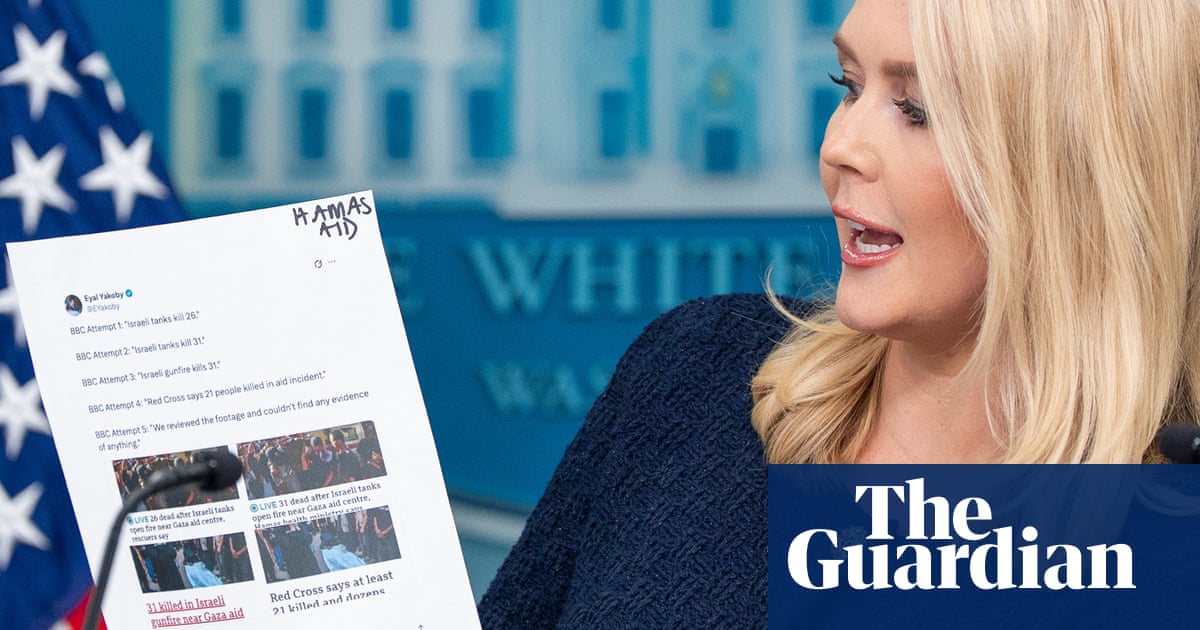The BBC has defended its reporting on the war inGazaand accused the White House of misrepresenting its journalism after Donald Trump’s administration criticised its coverage of a fatal attack near a US-backed aid distribution site.
SeniorBBCjournalists said the White House was political point-scoring after Trump’s press secretary, Karoline Leavitt, accused the corporation of taking “the word of Hamas with total truth”. She also falsely claimed that the BBC had removed a story about the incident.
Leavitt launched her attack on the BBC after being asked about reports that Israeli forces opened fire near an aid distribution centre in Rafah. Brandishing a print-out of images taken from the BBC’s website, she accused the corporation of having to “correct and take down” its story about the fatalities and injuries involved in the attack.
The Hamas-run health ministry had saidat least 31 people were killed in the gunfire. The International Committee of the Red Cross (ICRC) later said at least 21 Palestinians were killed by IDF troops.
In a briefing on Tuesday, Leavitt said: “The administration is aware of those reports and we are currently looking into the veracity of them because, unfortunately, unlike some in the media, we don’t take the word of Hamas with total truth. We like to look into it when they speak, unlike the BBC.
“And then, oh, wait, they had to correct and take down their entire story, saying: ‘We reviewed the footage and couldn’t find any evidence of anything.’”
The BBC swiftly issued a robust statement. It said that casualty numbers were updated throughout the day from multiple sources, as is the case of any incident of the kind in a chaotic war zone. It also clarified that the accusation from Leavitt that the BBC had removed a story was false.
“The claim the BBC took down a story after reviewing footage is completely wrong,” it said. “We did not remove any story and we stand by our journalism.
“Our news stories and headlines about Sunday’s aid distribution centre incident were updated throughout the day with the latest fatality figures as they came in from various sources … This is totally normal practice on any fast-moving news story.”
It said the White House had conflated that incident with a “completely separate” report by BBC Verify, the corporation’s factchecking team, which found a viral video posted on social media was not linked to the aid distribution centre it claimed to show. “This video did not run on BBC news channels and had not informed our reporting,” it said. “Conflating these two stories is simply misleading.”
Sign up toFirst Thing
Our US morning briefing breaks down the key stories of the day, telling you what’s happening and why it matters
after newsletter promotion
The BBC called on the White House to join forces with its calls for “immediate access” to Gaza. International journalists are prevented from entering by Israel.
Jonathan Munro, the deputy director of the BBC News, said the claims were wrong, adding: “It’s important that accurate journalism is respected, and that governments call for free access to Gaza.”
Jeremy Bowen, the corporation’s international editor, accused the White House of launching a political attack. “To be quite frank, theTrump administrationdoes not have a good record when it comes to telling the truth itself,” he said. “She’s making a political point, basically.
“Israel doesn’t let us in because it’s doing things there, clearly I think, that they don’t want us to see otherwise they would allow free reporting.
“I’ve reported on wars for the best part of 40 years. I’ve reported on more than 20 wars. And I’m telling you, even when you get full access, it is really difficult to report them. When you can’t get in, it’s even harder.”
